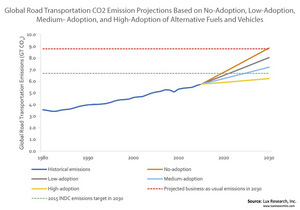BOSTON, MA--(Marketwired - Apr 26, 2016) - Global road transportation accounts for a sixth of all global carbon dioxide (CO2) emissions -- and its share is rising, making it a key target for emission cuts to fight climate change. A new analysis from Lux Research finds that the emergence of low-carbon fuels and vehicle efficiency will cut emissions by 29% in 2030.
The sharp cut -- exceeding the Intended Nationally Determined Contributions (INDC) target of 24% set by 188 nations at the Paris Conference of the Parties (COP21) in 2015 -- will be realized from a combination of low-carbon fuels, alternative fuel vehicles, and improved fuel efficiencies.
"Global warming remains at center stage, and significant strides need to be made in road transportation technologies to achieve the goal set for 2030," said Yuan-Sheng Yu, Lux Research Analyst and lead author of the report titled, "Driving Down Emissions: Achieving CO2 Emissions Reduction Goals through Biofuels and Alternative Fuel Vehicles."
"Low-carbon biofuels like cellulosic ethanol, renewable diesel, and biomethane have lower well-to-wheel carbon intensities compared to their first-generation counterparts and play a pivotal role in cutting emissions, as does renewable electricity," he added.
Lux Research evaluated measures needed to meet emission targets set at COP21. Among their findings:
- Biofuels are key. First-generation biofuels, low-carbon fuels, and natural gas vehicles will together account for at least 45.4% of the potential fossil fuel displacement in road transportation in 2030, when global road transportation demand is projected to reach 911 billion gallons.
- Carbon intensity matters. First-generation biofuels have made incremental reductions in road transportation emissions over the years. But low-carbon biofuels will be the key driver in achieving 2030 emissions reduction goals with an average three to four times lower well-to-wheel carbon intensity profile.
- Fuel efficiency counts. Without improved fuel efficiencies, emissions reduction falls short of the INDC target in 2030 by nearly 5%. Automobile makers will have a range of lightweight materials available as multinationals and start-ups develop the next-generations of steel, aluminum and composite technologies.
The report, titled "Driving Down Emissions: Achieving CO2 Emissions Reduction Goals through Biofuels and Alternative Fuel Vehicles," is part of the Lux Research Alternative Fuels Intelligence service.
About Lux Research
Lux Research provides strategic advice and ongoing intelligence for emerging technologies. Leaders in business, finance and government rely on us to help them make informed strategic decisions. Through our unique research approach focused on primary research and our extensive global network, we deliver insight, connections and competitive advantage to our clients. Visit www.luxresearchinc.com for more information.
Contact Information:
Contact:
Carole Jacques
Lux Research, Inc.
617-502-5314
carole.jacques@luxresearchinc.com
